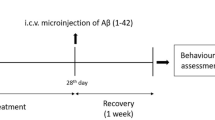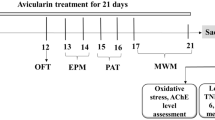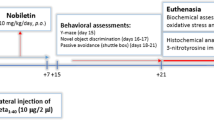Abstract
Alzheimer’s disease (AD) is a chronic neurodegenerative disorder and the most common phenotype of dementia. Trigonelline is an alkaloid found in medicinal plants such as fenugreek seeds and coffee beans with neuroprotective potential and according to existing evidences, a favorable agent for treatment of neurodegenerative disorders. In this study, the possible protective effect of trigonelline against intracerebral Aβ(1–40) as a model of AD in the rat was investigated. For induction of AD, aggregated A(1–40) (10 μg/2 휇l for each side) was bilaterally microinjected into the hippocampal CA1 area. Trigonelline was administered p.o. at a dose of 100 mg/kg. The results showed that trigonelline pretreatment of Aβ-microinjected rats significantly improves spatial recognition memory in Y maze and performance in novel object recognition (NOR) task, mitigates hippocampal malondialdehyde (MDA), protein carbonyl, lactate dehydrogenase (LDH), and improves mitochondrial membrane potential (MMP), glutathione (GSH), and superoxide dismutase (SOD) with no significant change of catalase activity, nitrite level, caspase 3 activity, and DNA fragmentation. Additionally, trigonelline ameliorated hippocampal levels of glial fibrillary acidic protein (GFAP), S100b, cyclooxygenase 2 (Cox2), tumor necrosis factor α (TNFα), and interleukin 6 (IL-6) with no significant alteration of inducible nitric oxide synthase (iNOS). In addition, trigonelline pretreatment prevented loss of hippocampal CA1 neurons in Aβ-microinjected group. Therefore, our results suggest that trigonelline pretreatment in Aβ model of AD could improve cognition and is capable to alleviate neuronal loss through suppressing oxidative stress, astrocyte activity, and inflammation and also through preservation of mitochondrial integrity.






Similar content being viewed by others
References
Afifi NA, Ramadan A, Erian EY, Saleh DO, Sedik AA, Badawi M, El Hotaby W (2017) Trigonelline attenuates hepatic complications and molecular alterations in high-fat high-fructose diet-induced insulin resistance in rats. Can J Physiol Pharmacol 95:427–436. https://doi.org/10.1139/cjpp-2016-0269
Afshin-Majd S, Khalili M, Roghani M, Mehranmehr N, Baluchnejadmojarad T (2015) Carnosine exerts neuroprotective effect against 6-hydroxydopamine toxicity in hemiparkinsonian rat. Mol Neurobiol 51:1064–1070. https://doi.org/10.1007/s12035-014-8771-0
Aksenov MY, Aksenova MV, Markesbery WR, Butterfield DA (1998) Amyloid beta-peptide (1-40)-mediated oxidative stress in cultured hippocampal neurons. Protein carbonyl formation, CK BB expression, and the level of Cu, Zn, and Mn SOD mRNA. J Mol Neurosci 10:181–192. https://doi.org/10.1007/bf02761773
Al-Bayaty F, Abdulla MA (2012) A comparison of wound healing rate following treatment with aftamed and chlorine dioxide gels in streptozotocin-induced diabetic rats. Evid Based Complement Alternat Med 2012
Amorim JA, Canas PM, Tome AR, Rolo AP, Agostinho P, Palmeira CM, Cunha RA (2017) Mitochondria in excitatory and inhibitory synapses have similar susceptibility to amyloid-beta peptides modeling Alzheimer's disease. J Alzheimers Dis 60:525–536. https://doi.org/10.3233/jad-170356
Antunes M, Biala G (2012) The novel object recognition memory: neurobiology, test procedure, and its modifications. Cogn Process 13:93–110. https://doi.org/10.1007/s10339-011-0430-z
Bagheri M, Joghataei MT, Mohseni S, Roghani M (2011) Genistein ameliorates learning and memory deficits in amyloid beta(1-40) rat model of Alzheimer's disease. Neurobiol Learn Mem 95:270–276. https://doi.org/10.1016/j.nlm.2010.12.001
Bagheri M, Rezakhani A, Nystrom S, Turkina MV, Roghani M, Hammarstrom P, Mohseni S (2013) Amyloid beta(1-40)-induced astrogliosis and the effect of genistein treatment in rat: a three-dimensional confocal morphometric and proteomic study. PLoS One 8:e76526. https://doi.org/10.1371/journal.pone.0076526
Benzing WC, Mufson EJ (1995) Increased number of NADPH-d-positive neurons within the substantia innominata in Alzheimer's disease. Brain Res 670:351–355
Bradford MM (1976) A rapid and sensitive method for the quantitation of microgram quantities of protein utilizing the principle of protein-dye binding. Anal Biochem 72:248–254
Butterfield DA (2004) Proteomics: a new approach to investigate oxidative stress in Alzheimer's disease brain. Brain Res 1000:1–7. https://doi.org/10.1016/j.brainres.2003.12.012
Campbell VA, Gowran A (2007) Alzheimer's disease; taking the edge off with cannabinoids? Br J Pharmacol 152:655–662. https://doi.org/10.1038/sj.bjp.0707446
Chowdhury AA, Gawali NB, Munshi R, Juvekar AR (2018) Trigonelline insulates against oxidative stress, proinflammatory cytokines and restores BDNF levels in lipopolysaccharide induced cognitive impairment in adult mice. Metab Brain Dis 33:681–691. https://doi.org/10.1007/s11011-017-0147-5
Cirillo C, Capoccia E, Iuvone T, Cuomo R, Sarnelli G, Steardo L, Esposito G (2015) S100B inhibitor Pentamidine attenuates reactive gliosis and reduces neuronal loss in a mouse model of Alzheimer's disease. Biomed Res Int 2015:508342. https://doi.org/10.1155/2015/508342
Claiborne A (1985) Catalase activity. In: CRC handbook of methods for oxygen radical research, edited by Greenwald RA. Boca Raton, FL: CRC.: 283–284
Colom LV, Castaneda MT, Hernandez S, Perry G, Jaime S, Touhami A (2011) Intrahippocampal amyloid-beta (1-40) injections injure medial septal neurons in rats. Curr Alzheimer Res 8:832–840
Deng Y, Long L, Wang K, Zhou J, Zeng L, He L, Gong Q (2017) Icariside II, a broad-Spectrum anti-cancer agent, reverses Beta-amyloid-induced cognitive impairment through reducing inflammation and apoptosis in rats. Front Pharmacol 8:39. https://doi.org/10.3389/fphar.2017.00039
Ding J, Yu HL, Ma WW, Xi YD, Zhao X, Yuan LH, Feng JF, Xiao R (2013) Soy isoflavone attenuates brain mitochondrial oxidative stress induced by beta-amyloid peptides 1-42 injection in lateral cerebral ventricle. J Neurosci Res 91:562–567. https://doi.org/10.1002/jnr.23163
Ellman GL (1959) Tissue sulfhydryl groups. Arch Biochem Biophys 82:70–77
Gargiulo L, Bermejo M, Liras A (2000) Reduced neuronal nitric oxide synthetase and c-protein kinase levels in Alzheimer's disease. Rev Neurol 30:301–303
Ghofrani S, Joghataei MT, Mohseni S, Baluchnejadmojarad T, Bagheri M, Khamse S, Roghani M (2015) Naringenin improves learning and memory in an Alzheimer's disease rat model: insights into the underlying mechanisms. Eur J Pharmacol 764:195–201. https://doi.org/10.1016/j.ejphar.2015.07.001
He P, Ouyang X, Zhou S, Yin W, Tang C, Laudon M, Tian S (2013) A novel melatonin agonist Neu-P11 facilitates memory performance and improves cognitive impairment in a rat model of Alzheimer' disease. Horm Behav 64:1–7. https://doi.org/10.1016/j.yhbeh.2013.04.009
Hyman BT, Marzloff K, Wenniger JJ, Dawson TM, Bredt DS, Snyder SH (1992) Relative sparing of nitric oxide synthase-containing neurons in the hippocampal formation in Alzheimer's disease. Ann Neurol 32:818–820. https://doi.org/10.1002/ana.410320618
Khalili M, Alavi M, Esmaeil-Jamaat E, Baluchnejadmojarad T, Roghani M (2018) Trigonelline mitigates lipopolysaccharide-induced learning and memory impairment in the rat due to its anti-oxidative and anti-inflammatory effect. Int Immunopharmacol 61:355–362. https://doi.org/10.1016/j.intimp.2018.06.019
Khan MB, Khan MM, Khan A, Ahmed ME, Ishrat T, Tabassum R, Vaibhav K, Ahmad A, Islam F (2012) Naringenin ameliorates Alzheimer's disease (AD)-type neurodegeneration with cognitive impairment (AD-TNDCI) caused by the intracerebroventricular-streptozotocin in rat model. Neurochem Int 61:1081–1093. https://doi.org/10.1016/j.neuint.2012.07.025
Khan A, Vaibhav K, Javed H, Tabassum R, Ahmed ME, Khan MM, Khan MB, Shrivastava P, Islam F, Siddiqui MS, Safhi MM, Islam F (2014) 1,8-cineole (eucalyptol) mitigates inflammation in amyloid Beta toxicated PC12 cells: relevance to Alzheimer's disease. Neurochem Res 39:344–352. https://doi.org/10.1007/s11064-013-1231-9
Kiasalari Z, Roghani M, Khalili M, Rahmati B, Baluchnejadmojarad T (2013) Antiepileptogenic effect of curcumin on kainate-induced model of temporal lobe epilepsy. Pharm Biol 51:1572–1578. https://doi.org/10.3109/13880209.2013.803128
Kiasalari Z, Khalili M, Baluchnejadmojarad T, Roghani M (2016) Protective effect of Oral Hesperetin against unilateral striatal 6-Hydroxydopamine damage in the rat. Neurochem Res 41:1065–1072. https://doi.org/10.1007/s11064-015-1796-6
Korzeniewski C, Callewaert DM (1983) An enzyme-release assay for natural cytotoxicity. J Immunol Methods 64:313–320
LaFerla FM, Green KN, Oddo S (2007) Intracellular amyloid-beta in Alzheimer's disease. Nat Rev Neurosci 8:499–509. https://doi.org/10.1038/nrn2168
Li Z, Tong Q, Xu H, Hu L, Zhao R, Zhou F, Pan W, Zhou L (2015) Therapeutic effects of TianDiJingWan on the abeta 25-35-induced alzheimer's disease model rats. Evid Based Complement Alternat Med 2015:307350. https://doi.org/10.1155/2015/307350
Liu J, Saponjian Y, Mahoney MM, Staley KJ, Berdichevsky Y (2017) Epileptogenesis in organotypic hippocampal cultures has limited dependence on culture medium composition. PLoS One 12:e0172677. https://doi.org/10.1371/journal.pone.0172677
Ma W, Yuan L, Yu H, Ding B, Xi Y, Feng J, Xiao R (2010) Genistein as a neuroprotective antioxidant attenuates redox imbalance induced by beta-amyloid peptides 25-35 in PC12 cells. Int J Dev Neurosci 28:289–295. https://doi.org/10.1016/j.ijdevneu.2010.03.003
Mancuso M, Orsucci D, LoGerfo A, Calsolaro V, Siciliano G (2010) Clinical features and pathogenesis of Alzheimer's disease: involvement of mitochondria and mitochondrial DNA. Adv Exp Med Biol 685:34–44
Min LJ, Kobayashi Y, Mogi M, Tsukuda K, Yamada A, Yamauchi K, Abe F, Iwanami J, Xiao JZ, Horiuchi M (2017) Administration of bovine casein-derived peptide prevents cognitive decline in Alzheimer disease model mice. PLoS One 12:e0171515. https://doi.org/10.1371/journal.pone.0171515
Mirzaie M, Khalili M, Kiasalari Z, Roghani M (2016) Neuroprotective and Antiapoptotic potential of Trigonelline in a striatal 6-Hydroxydopamine rat model of Parkinson’s disease. Neurophysiology 48:176–183. https://doi.org/10.1007/s11062-016-9586-6
Morroni F, Tarozzi A, Sita G, Bolondi C, Zolezzi Moraga JM, Cantelli-Forti G, Hrelia P (2013) Neuroprotective effect of sulforaphane in 6-hydroxydopamine-lesioned mouse model of Parkinson's disease. Neurotoxicology 36:63–71. https://doi.org/10.1016/j.neuro.2013.03.004
Movsesyan VAYA, Dabaghyan EA, Stoica BA, Faden AI (2002) Ceramide induces neuronal apoptosis through the caspase-9/caspase-3 pathway. Biochem Biophys Res Commun 299:201–207
Nitta A, Murai R, Suzuki N, Ito H, Nomoto H, Katoh G, Furukawa Y, Furukawa S (2002) Diabetic neuropathies in brain are induced by deficiency of BDNF. Neurotoxicol Teratol 24:695–701
Obulesu M, Jhansilakshmi M (2014) Neuroinflammation in Alzheimer's disease: an understanding of physiology and pathology. Int J Neurosci 124:227–235. https://doi.org/10.3109/00207454.2013.831852
Panda S, Biswas S, Kar A (2013) Trigonelline isolated from fenugreek seed protects against isoproterenol-induced myocardial injury through down-regulation of Hsp27 and alphaB-crystallin. Nutrition 29:1395–1403. https://doi.org/10.1016/j.nut.2013.05.006
Piermartiri TC, Figueiredo CP, Rial D, Duarte FS, Bezerra SC, Mancini G, de Bem AF, Prediger RD, Tasca CI (2010) Atorvastatin prevents hippocampal cell death, neuroinflammation and oxidative stress following amyloid-beta(1-40) administration in mice: evidence for dissociation between cognitive deficits and neuronal damage. Exp Neurol 226:274–284. https://doi.org/10.1016/j.expneurol.2010.08.030
Raoufi S, Baluchnejadmojarad T, Roghani M, Ghazanfari T, Khojasteh F, Mansouri M (2015) Antidiabetic potential of salvianolic acid B in multiple low-dose streptozotocin-induced diabetes. Pharm Biol 53:1803–1809. https://doi.org/10.3109/13880209.2015.1008148
Reddy PH (2006) Amyloid precursor protein-mediated free radicals and oxidative damage: implications for the development and progression of Alzheimer's disease. J Neurochem 96:1–13. https://doi.org/10.1111/j.1471-4159.2005.03530.x
Rege SD, Geetha T, Broderick TL, Babu JR (2015) Resveratrol protects beta amyloid-induced oxidative damage and memory associated proteins in H19-7 hippocampal neuronal cells. Curr Alzheimer Res 12:147–156
Roghani M, Baluchnejadmojarad T (2010) Mechanisms underlying vascular effect of chronic resveratrol in streptozotocin-diabetic rats. Phytother Res 24(Suppl 2):S148–S154. https://doi.org/10.1002/ptr.3032
Roghani M, Joghataie MT, Jalali MR, Baluchnejadmojarad T (2006) Time course of changes in passive avoidance and Y-maze performance in male diabetic rats. Iran Biomed J 10:99–104
Stuart SA, Robertson JD, Marrion NV, Robinson ES (2013) Chronic pravastatin but not atorvastatin treatment impairs cognitive function in two rodent models of learning and memory. PLoS One 8:e75467. https://doi.org/10.1371/journal.pone.0075467
Subash S, Essa MM, Al-Asmi A, Al-Adawi S, Vaishnav R (2014) Chronic dietary supplementation of 4% figs on the modification of oxidative stress in Alzheimer's disease transgenic mouse model. Biomed Res Int 2014:546357. https://doi.org/10.1155/2014/546357
Swerdlow RH, Burns JM, Khan SM (2010) The Alzheimer's disease mitochondrial cascade hypothesis. J Alzheimers Dis 20(Suppl 2):S265–S279. https://doi.org/10.3233/JAD-2010-100339
Tao Z, Van Gool D, Lammens M, Dom R (1999) NADPH-diaphorase-containing neurons in cortex, subcortical white matter and neostriatum are selectively spared in Alzheimer's disease. Dement Geriatr Cogn Disord 10:460–468. https://doi.org/10.1159/000017190
Tharaheswari M, Jayachandra Reddy N, Kumar R, Varshney KC, Kannan M, Sudha Rani S (2014) Trigonelline and diosgenin attenuate ER stress, oxidative stress-mediated damage in pancreas and enhance adipose tissue PPARgamma activity in type 2 diabetic rats. Mol Cell Biochem 396:161–174. https://doi.org/10.1007/s11010-014-2152-x
Tohda C, Kuboyama T, Komatsu K (2005) Search for natural products related to regeneration of the neuronal network. Neurosignals 14:34–45. https://doi.org/10.1159/000085384
Tohgi H, Abe T, Yamazaki K, Murata T, Ishizaki E, Isobe C (1999) Alterations of 3-nitrotyrosine concentration in the cerebrospinal fluid during aging and in patients with Alzheimer's disease. Neurosci Lett 269:52–54
Tran MH, Yamada K, Olariu A, Mizuno M, Ren XH, Nabeshima T (2001) Amyloid beta-peptide induces nitric oxide production in rat hippocampus: association with cholinergic dysfunction and amelioration by inducible nitric oxide synthase inhibitors. FASEB J 15:1407–1409
Valles SL, Dolz-Gaiton P, Gambini J, Borras C, Lloret A, Pallardo FV, Vina J (2010) Estradiol or genistein prevent Alzheimer's disease-associated inflammation correlating with an increase PPAR gamma expression in cultured astrocytes. Brain Res 1312:138–144. https://doi.org/10.1016/j.brainres.2009.11.044
Wang SX, Xiong XM, Song T, Liu LY (2005) Protective effects of cariporide on endothelial dysfunction induced by high glucose. Acta Pharmacol Sin 26:329–333. https://doi.org/10.1111/j.1745-7254.2005.00042.x
Watson C (2004) The rat brain in stereotaxic coordinates-the new coronal set. Academic press
Yamaguchi Y, Kawashima S (2001) Effects of amyloid-beta-(25-35) on passive avoidance, radial-arm maze learning and choline acetyltransferase activity in the rat. Eur J Pharmacol 412:265–272
Yoshinari O, Takenake A, Igarashi K (2013) Trigonelline ameliorates oxidative stress in type 2 diabetic Goto-Kakizaki rats. J Med Food 16:34–41. https://doi.org/10.1089/jmf.2012.2311
Zhang L, Dong S, Zhao G, Ma Y (2014) 7.0T nuclear magnetic resonance evaluation of the amyloid beta (1-40) animal model of Alzheimer's disease: comparison of cytology verification. Neural Regen Res 9:430–435. https://doi.org/10.4103/1673-5374.128255
Zhang Q, Li J, Liu C, Song C, Li P, Yin F, Xiao Y, Li J, Jiang W, Zong A, Zhang X, Wang F (2015) Protective effects of low molecular weight chondroitin sulfate on amyloid beta (Abeta)-induced damage in vitro and in vivo. Neuroscience 305:169–182. https://doi.org/10.1016/j.neuroscience.2015.08.002
Zhou J, Chan L, Zhou S (2012) Trigonelline: a plant alkaloid with therapeutic potential for diabetes and central nervous system disease. Curr Med Chem 19:3523–3531
Zhou JY, Du XH, Zhang Z, Qian GS (2017) Trigonelline inhibits inflammation and protects beta cells to prevent fetal growth restriction during pregnancy in a mouse model of diabetes. Pharmacology 100:209–217. https://doi.org/10.1159/000479088
Zhu X, Lee HG, Casadesus G, Avila J, Drew K, Perry G, Smith MA (2005) Oxidative imbalance in Alzheimer's disease. Mol Neurobiol 31:205–217. https://doi.org/10.1385/MN:31:1-3:205
Acknowledgements
This study was part of a Ph.D. thesis project that was approved and financially supported by Physiology Research Center affiliated to Iran University of Medical Sciences in 2014 (grant # 93-03-130-24998).
Author information
Authors and Affiliations
Corresponding author
Ethics declarations
Conflict of interest
The authors declare no conflict of interests.
Rights and permissions
About this article
Cite this article
Fahanik-Babaei, J., Baluchnejadmojarad, T., Nikbakht, F. et al. Trigonelline protects hippocampus against intracerebral Aβ(1–40) as a model of Alzheimer’s disease in the rat: insights into underlying mechanisms. Metab Brain Dis 34, 191–201 (2019). https://doi.org/10.1007/s11011-018-0338-8
Received:
Accepted:
Published:
Issue Date:
DOI: https://doi.org/10.1007/s11011-018-0338-8




